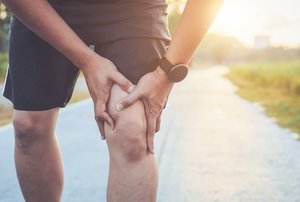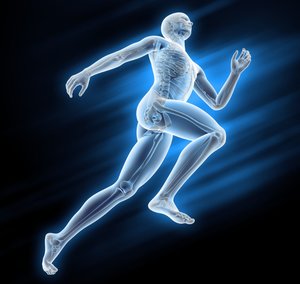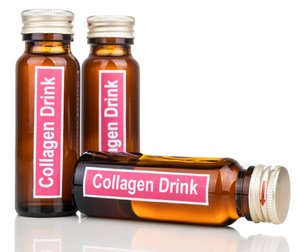
More and more of us are becoming aware of the importance of working on our physical mobility and the health of our joints and bones, especially if we engage in regular sports and/or are beginning to age. In this article, international mobility expert and ambassador, Jerk W. Langer, MD, shares insights on what we can do to improve our mobility and maintain strong, healthy joints and bones. Jerk is a lifestyle-focused physician in Denmark, bestselling author, and lecturer at the University of Copenhagen’s Faculty of Health and Medical Sciences.
Mobility pain: a common complaint

Millions of people worldwide are affected by mobility issues. Jerk W. Langer refers to a recent survey of 30,000 Danish people, in which a third of all participants answered that they had joint or muscle pain several times a week throughout the observation period. ‘The impact pain like this can have is striking,’ he observes. ‘One in twenty respondents said their ability to work was compromised as a result.’ Clearly, it’s high time we unpack this real-life problem in more detail.
About Jerk W. Langer
Jerk W. Langer is a lifestyle-focused physician, public speaker, and science communicator, based in Copenhagen, Denmark. He is the author of several bestselling books, including one on collagen. He frequently appears as an expert on Danish national television, radio shows, podcasts, and news media. He has also collaborated on presentations with Rousselot and Peptan. Jerk is a lecturer at the University of Copenhagen, Faculty of Health and Medical Sciences, as well as in postgraduate education for general practitioners. Jerk is a member of several advisory boards and expert committees.
Why do my joints and bones hurt?

In a complex system like the body, it can be hard to pin down exactly why individuals suffer from mobility issues. In general terms, we can highlight the importance of one key protein in our body: collagen. Collagen plays a vital role in a healthy musculoskeletal system, helping us to walk, run, and move freely. This is because collagen is an essential component of our joints and bones: it’s responsible for our strength, flexibility, and resistance. As years go by and our collagen levels fall drastically, we can experience decreased mobility, gait problems, stiffness and discomfort, and a higher risk of falls. ‘I can see this in my practice’, explains Jerk. ‘So many of my patients and clients love to exercise, but are beginning to feel the wear-and-tear in the body as collagen production declines.’
How can I reduce my mobility pain?
For those dealing with these, sometimes debilitating, mobility issues, what solutions are available? Jerk answers: ‘Of course, I take a synergistic perspective. This means I encourage my patients to:

- Make healthy food choices;
- Do a lot of daily exercise;
- Avoid being overweight;
- Improve sleep habits;
- Decrease chronic stress;
- Stop smoking;
- And avoid excessive alcohol consumption.
In addition to these very solid guidelines, a promising new option has emerged: collagen peptide supplementation. As collagen levels drop as we age, it makes sense that we supplement it proactively to continue being able to move effortlessly. It’s a way of ensuring that our bones, tendons, and joints stay strong. And it’s not just for professional athletes – it’s beneficial for, and accessible to, anyone who enjoys an active lifestyle.’
Collagen peptides supplements and science

Alongside maintaining a healthy lifestyle, Jerk sees collagen supplementation as a science-backed solution to numerous mobility issues. ‘In my clinical work, I often choose to recommend collagen peptide supplementation as part of my dietary and lifestyle advice. I do this because the growing mosaic of clinical evidence is convincing.* Jerk continues: ‘Overall, supplementing with collagen peptides could be a good choice for an array of mobility challenges. In scientific publications, collagen peptides have shown positive effects related to:
- Sports injuries;
- Recovery following exercise;
- Sports performance;
- Problems with joints, tendons, and other discomforting conditions that impair mobility.
‘I trusted collagen peptides after my injury’

While emphasizing that anecdotal evidence can never be equated to scientific fact, Jerk makes sure to practice what he preaches: ‘In my personal life, with my own mobility and joint and bone health, I’ve seen the benefits that collagen peptide supplements can have, and I’m enthusiastic about collagen – I’ve even written a book about it. I’ve finished over 400 marathons and had my fair share of injuries; after one particular race, I was left with a serious injury caused by a wear-and-tear rupture of the posterior tibial tendon in my right ankle. I was really scared that I would be forced to stop running for good. I chose to supplement with collagen peptides, hoping to build up a new string of dense, fibrous, collagen-rich tissue over time in the remaining tendon sheath. One year later, I happily finished another marathon without any ankle problems. Needless to say, my orthopedic surgeon was very impressed.’
‘Want to boost your mobility? Try collagen peptides’
If you are looking to support your joints and bones and mobility, aiming to stay active for as long as possible, maintaining a healthy lifestyle is crucial, Jerk stresses. ‘Even simple changes to your daily routine have a big impact’, he says, ‘and the synergistic effects of a healthy diet, weight control, exercise, and good sleep quality should never be neglected.’ In addition to all of that, he says, collagen peptides should be considered as a beneficial and promising add-on to an otherwise healthy diet. ‘Today, collagen peptides supplements are going mainstream. They can play a role in encouraging mobility for all.’
DISCLAIMER:
Rousselot makes no representation or warranty, whether expressed or implied, as to the accuracy, reliability, or completeness of the information, nor does it assume any legal liability, whether direct or indirect, for any information. Use of this information shall be at your discretion and risk. Nothing herein relieves you from carrying out your own suitability determinations and tests and from your obligation to comply with all applicable laws and regulations and to observe all third-party rights. This product is not intended to diagnose, treat, cure, or prevent any disease.
